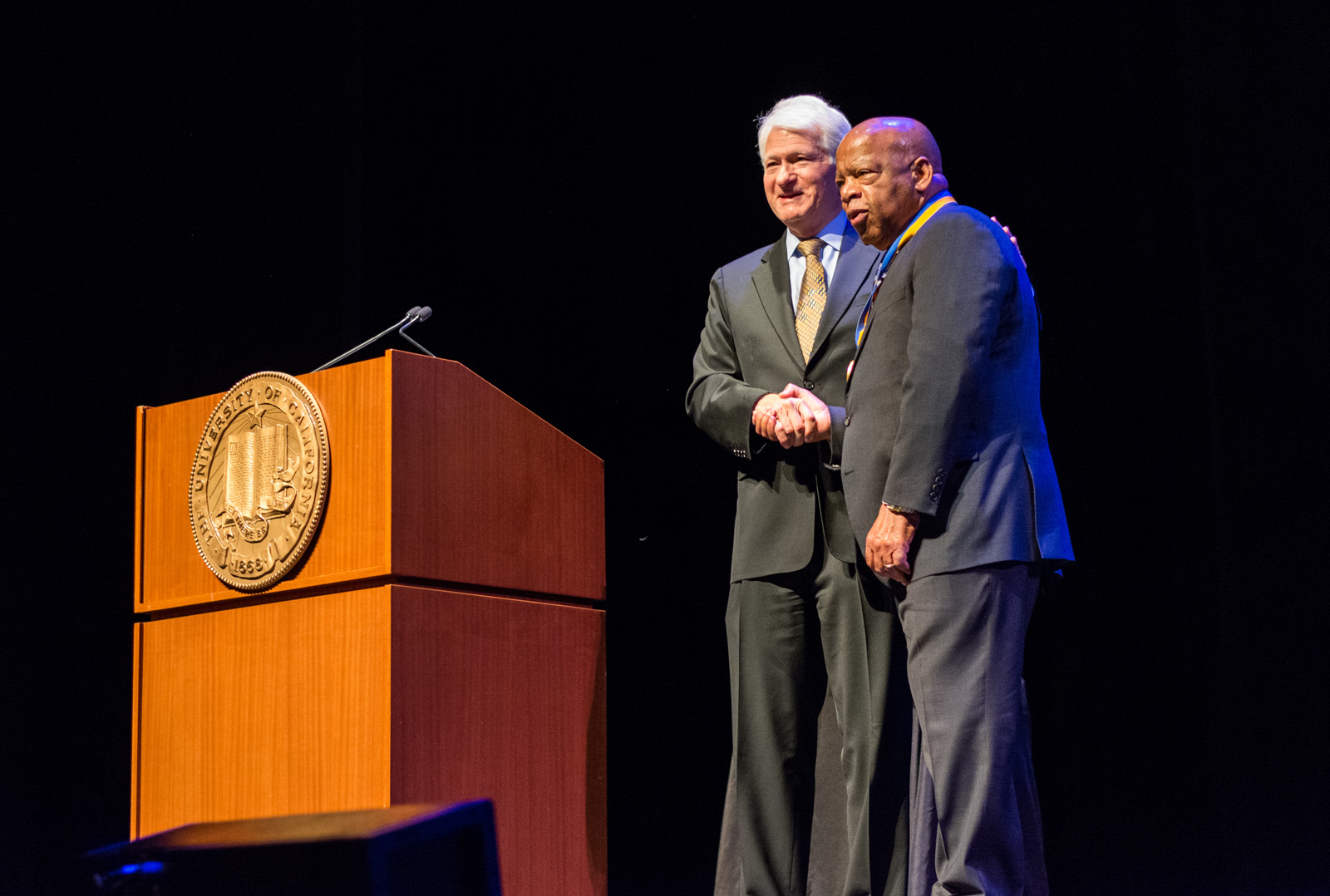Rep. John Lewis awarded UCLA Medal at Winston C. Doby Lecture

Chancellor Gene Block and Rep. John Lewis shook hands after Lewis was awarded the UCLA Medal. (MacKenzie Coffman/Daily Bruin)
By Dina Stumpf
April 10, 2017 11:15 p.m.
As a young man living in Nashville, Tennessee, Rep. John Lewis sat at whites-only lunch counters in protest of segregation and was told that he would get arrested if he continued.
Lewis acknowledged this and went to purchase a suit. If he was going to get arrested, he said, he wanted to look clean and fresh.
“I got arrested 40 times during the (1960s) and since I’ve been in Congress, another five times,” Lewis said.
Lewis, one of the major civil rights movement figures and a congressman, called on young people to get involved in social action and public service at the fifth annual Winston C. Doby Distinguished Lecture in Royce Hall on Monday. Lewis delivered the keynote speech at the Academic Advancement Program’s event, which commemorates Doby, a former vice chancellor for student affairs who founded the AAP.
Lewis received a standing ovation as Chancellor Gene Block awarded him the UCLA Medal, the university’s highest honor, at the beginning of the event.
Lewis began his speech by recalling his childhood raising chickens in rural Alabama.
“Some of the chickens from the ’40s and ’50s seemed to listen to me more than some of my colleagues today,” Lewis said with a laugh.
Lewis said that growing up, he often asked why there were designated “whites” and “colored” areas. His parents told him not to get into trouble, and “that’s the way it is,” he said.
When he was 15 years old, Lewis heard about Rosa Parks’ arrest, which inspired him to participate in protests during the civil rights movement.
“If it hadn’t been for Martin Luther King Jr. and Rosa Parks, I don’t know what would have happened,” Lewis said. “These individuals told me to speak out.”
Following these civil rights movement leaders’ footsteps, Lewis protested and was arrested many times. His last arrest, which occurred in 2013, was during a protest for an immigration law reform.
Many of Lewis’ experiences as an activist in the 1960s led to violence. Lewis was part of the Freedom Riders protests, during which black and white people would sit together in segregated Greyhound buses. People beat him and other protesters, leaving them bloodied, he said.
In his speech, Lewis also recalled a 1965 black voting registration campaign in Selma, Alabama, in which people were beaten, a woman was shot and a young minister was beaten to death simply for fighting for the right to vote.
He added he thinks people must advocate in an orderly, peaceful and nonviolent fashion to create change. Lewis also said young people should use their education to bring about change in their communities.
“If you see something not fair (and) not right, you have a moral obligation to get in the way and get into trouble,” Lewis said. “We have made progress, but we (still) have a great distance to go.”
Lewis added that though Americans’ ancestors may have come to the country in different ships, citizens are all in the same boat now. He thinks the current political climate and its divide is tough, but he feels optimistic for the future.
“I am very hopeful (and) very optimistic that this too shall pass,” Lewis said. “We need more gifted, smart young people to get involved and get out there and push and pull.”
Students in the audience said they found his lecture inspiring.
Melissa Orozco, a first-year political science student, said she thought the speech was important considering the current political climate.
“Getting more young people involved is very quintessential for our present time,” Orozco said. “It’s important to get a call of action and to just be more involved.”
Thomas Mendoza, a third-year Chicana/o studies student, said he felt motivated to continue working and trying to improve his community.
“It was interesting how he was able to connect to today’s movements, the nonviolent movements, to those of the civil rights era,” Mendoza added.
Abigail Edwards, a third-year civil engineering student, said she was happy to hear Lewis talk about the importance of education.
“School can get very hard but this made me realize why I chose this path and makes me question what I can do more,” Edwards said.


